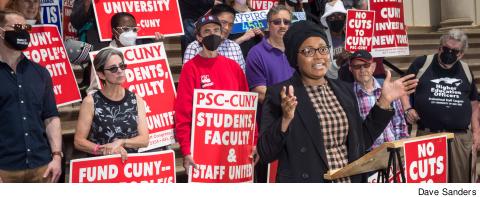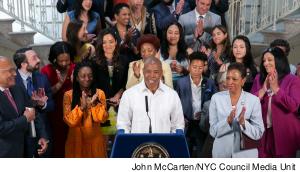CUNY spared but more funding needed
 |
Mayor Eric Adams and New York City Council Speaker Adrienne Adams have agreed to a city budget that enacts 3% cuts to most city agencies, sparing the New York City Police Department but not others, including K–12 schools.
The union waged an intense campaign to protect CUNY from budget cuts in recent months, by organizing rallies, lobbying New York City Council members and renewing its alliances with other CUNY advocates. Cuts to CUNY, fortunately, were minimal, and the University still has federal stimulus money to draw upon. The new budget agreement also included some additional funding for CUNY, including money for childcare centers and about $2 million for remediation programs.
MONEY FOR CUNY
A City Council statement said the budget included “$4.4 million to establish the [CUNY] Reconnect pilot program to help working-age adults attain a degree that expands earning potential and $1 million for CUNY STEM to support programming at campuses citywide.”
Union activists see a bigger fight ahead.
 |
“Now, we need to work with our new partners in the council to push for transparency as CUNY begins to spend the money it was allocated,” said Heather James, an assistant professor of political science at Borough of Manhattan Community College and a member of the union’s legislative committee. “This includes $2 million for remediation for which the PSC advocated and which was baselined into the executive budget for the first time this year. The PSC also advocated for new childcare and ESL program funding, which CUNY received.”
But, more than 100 community college faculty have left since the start of the pandemic, due to attrition and retirement, and have not been replaced. And while city budget cuts will make it harder to fill the empty posts, the entire system received a $220 million boost in state funding this spring, thanks to union activism, which will benefit both senior and community colleges.
PSC President James Davis discussed the effects of the pandemic on CUNY at a May 18 event outside of City Hall, held at the same time city lawmakers were discussing CUNY funding. CUNY has been battered by two years of the pandemic, with the loss of part-time and full-time faculty members over the past two years. But, he added, this loss is compounded by the years of austerity budgets for CUNY during better economic times. The union is making progress in reducing this problem with hard-won gains in state funding, but now it’s time for the city to do more, he said.
ROBUST INVESTMENT
“We need investment, not only to make ourselves whole, but to move forward,” Davis said. “It’s not enough to fend off the cuts. We need robust investment.”
Salimatou Doumbouya, chair of the CUNY University Student Senate and the student member of the CUNY Board of Trustees, noted that CUNY advocates demanded less than 1% of the city budget to be used to address CUNY’s current needs. “Is that too much to ask?” she asked.
While the city budget was not especially hard on CUNY, the New York City Department of Education for K–12 public schools faces a drastic $215 million cut, despite protests from teachers and other public education activists. Mayor Adams claims the decrease in funding is necessary because of lower enrollment in the public schools as a result of the pandemic. However, the PSC and other education advocacy organizations know that enrollment declines require more spending – not less – in order to bring students back.
Union activists also added that a lack of investment in the city’s public schools could hurt CUNY in the future, since the city’s public schools serve as the main pipeline for students who attend CUNY.
“It contains big cuts to our public schools, disproportionately affecting schools in low-income communities of color, which have long been underfunded and overcrowded,” said City Council Member Tiffany Cabán, whose district includes Astoria, Woodside and Jackson Heights in Queens. Cabán voted against the budget agreement. “Any decrease in enrollment should be seen as right-sizing the budget, not warranting further cuts.”
PSC activists, however, highlighted how the city budget campaign strengthened alliances between CUNY advocates.
“I’m proud to have been a part of such a member-driven city budget campaign,” James said. “I’m especially excited about the work we did to build bridges across titles and to increase interest in the city budget.”

